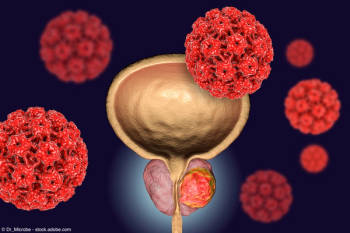
Prostate Cancer
Latest News
Video Series

Latest Videos
Shorts







Podcasts
CME Content
More News

This episode offers practical insights for clinicians navigating complex prostate cancer cases and underscores how precision imaging and tailored radiation strategies are redefining care for patients with advanced disease.

The approval is supported by data from the phase 3 AMPLITUDE trial.

"If 2025 showed us anything, it is the power of combining scientific progress with public engagement," writes Michael S. Cookson, MD, MMHC, FACS.

The pilot study plans to enroll patients with locally recurrent prostate cancer across clinical trial sites in the US.

The phase 1 study will assess the safety and feasibility of SPECT/CT imaging with [111In]In-ART-101.

Following treatment with SYNC-T, all bone metastases had resolved in 7 of the 13 patients.

The data come just days after the FDA approved IsoPSA to aid in the diagnosis of high-grade prostate cancer.

For micro-ultrasound compared with true cancer status, estimated sensitivity was 0.8000.

The group discussed wide variation in when and how patients transition from urology to medical oncology.

The investigators reported that new onset of CNS-related conditions was lower in patients in the apalutamide cohort at 12 months and 24 months post index.

Clinicians noted that symptoms—bone pain, declining function, anemia, and renal compromise—carry significant weight when choosing therapy.

The approval is supported by 12-month data from the prospective VAPOR 2 trial.

A recap of the FDA submissions and regulatory decisions in urology from November 2025.

The test is intended to aid in the decision for prostate biopsy in men aged 50 years or older who present with elevated PSA levels.

In this episode, Farnoosh Nik-Ahd, MD, joins host Adam Weiner, MD, to discuss emerging guidance on prostate cancer screening in transgender women.

According to the authors, the optimal duration of treatment could be tied to individual patient factors such as cancer risk.

Stacy Loeb, MD, MSc, PhD (Hon), debunks common misconceptions about prostate cancer and offers suggestions as to how urologists can help push back against misinformation.

The clearance supports new ultrasound imaging and workflow enhancements to the Focal One i, which was launched earlier this year.

The phase 3 AMPLITUDE trial evaluated the safety and efficacy of adding niraparib to abiraterone acetate plus prednisone in patients with mHSPC.

The ExactVu micro-ultrasound platform demonstrated noninferior detection of clinically significant prostate cancer vs MRI.

A major portion of the discussion focused on selecting among ARPIs for use with ADT in the mCSPC setting.

Jason M. Hafron, MD, CMO, touches on the growing shift toward biomarker-driven therapy in advanced prostate cancer.

Jason M. Hafron, MD, recaps noteworthy prostate cancer research from ESMO 2025.

Stacy Loeb, MD, discussed key takeaways from the European Randomized Study of Screening for Prostate Cancer.

Stacy Loeb, MD, shares key takeaways from her LUGPA 2025 session, “Current state of prostate cancer screening.”































